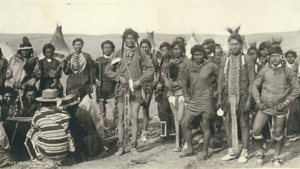Let’s Get Started
Luther’s oft quoted quip, “Here I stand,” has become a bit of a defensive posture for those trying to make a dogmatic point, but it’s worth noting that where you stand matters when proclaiming the Gospel. The staunch, recalcitrant feel of that Luther meme doesn’t speak to the chaotic truth that the Gospel is mediated in many ways, and from many vantages, for good or for ill.
And this truth is getting even more complicated.
Livestream. Facebook Live. And now this new reality: hybrid worship.
Platforms for ministry matter more than ever it seems.
But consider this: the Gospel has always been spread through different platforms, depending on context, and so while our new reality might be uncomfortable and confusing for some, it’s not brand new.
Reflect on this:
- Which platforms used for ministry in your context are most familiar? Which are the most confusing for you and your peers?
Next, read Matthew 5:1-12 and Luke 6:20-49
This text from MatthewA tax collector who became one of Jesus' 12 disciples. More is the beginning of a long grouping of episodes that the writer strings together colloquially called, “The Sermon on the Mount.” It contains some of the most well-known JesusJesus is the Messiah whose life, death, and resurrection are God's saving act for humanity. More sayings in the scripture, including the piece you read known as the Beatitudes. Before you meditate on the words of the text, though, consider the setting: Jesus is standing on a mountain, with a crowd gathered below. Consider what mountains mean in the scriptures and how they are places of holyHoly is a term that originally meant set apart for the worship or service of God. While the term may refer to people, objects, time, or places, holiness in Judaism and Christianity primarily denotes the realm of the divine More encounter. MosesProphet who led Israel out of Egypt to the Promised Land and received the law at Sinai. More met God on the mountain in Exodus 19. It was on the mountain that ElijahA miracle working Israelite prophet who opposed worship of Baal. More heard God’s “still, small voice” (1 Kings 19). Later in this Gospel, It will be on the mountain where Jesus will stand between those two figures and be transfigured before a few chosen disciples (Matthew 17).
Mountains, in the scriptures, are the place of holy words, holy encounters, and holy moments.
These same sayings from Jesus are documented in Luke’s version of the life of Jesus. LukeThe "beloved physician" and companion of Paul. More, however, has Jesus saying them on a totally different platform: a plain. Again, don’t consider the text quite yet. Rather, just consider the context, the platform. A plain is the place of equality, as everyone stands face-to-face. A plain is the place of egalitarianism, where advantage isn’t part of the equation. With the writer of Luke’s special attention to those at the margins of society, specifically women, children, and the outcast, this platform seems to be true to form for this Gospel.
These two Gospel snippets seem to record very similar words but from entirely different platforms.
So, consider the platforms and the text themselves.
A sermon given from a mountain seems to have quite a bit of authority to it, given the role that mountains and mountain-top experiences play in the scriptures. Matthew’s Beatitudes and their exhortations of blessedness may strike the ear differently when heard with the mountain platform in mind and land differently depending on where the hearer herself is standing.
A sermon given from a plain, conversely, has an altogether different feel. Luke even notes that Jesus “lifts his eyes to his disciples,” a movement of looking up at them. A sermon from this vantage lands on the ears in a completely different way than one spoken from the mountain.
Another way to consider it might be to think of a sermon from an elevated, lofty pulpit, and one delivered from the floor in the midst of the assembly. Neither is better than the other, but we should take seriously the idea that the platform matters and that one might be more appropriate than the other depending on the situation.
In the way the different Gospels tell the Jesus story, we find Jesus on different platforms, sometimes delivering the same, or similar message.
Reflect on this:
- Which platform do you identify with most: the authoritative mountain or the egalitarian plain? Which do you prefer to speak from? Which do you prefer your messages given from?
Now read Philippians 1:12-14 and Acts 17:16-34
In the Epistles, too, we find different platforms being used to deliver God’s message of love through Christ.
In Philippians, Ephesians, and Philemon we find PaulThe Apostle Paul, originally known as Saul of Tarsus, was the author of several New Testament letters and the founder of many Christian communities. More writing from prison—or at least house arrest—in Rome, the heart of the Empire. From here he delivers some of his most touching and theologically erudite advice. His letters to the Philippians and on behalf of his friend Philemon are heartfelt and almost sentimental as he describes his deep love and genuine affection for both. In the letter to the church at Ephesus we see Paul tackle esoteric and metaphysical ideas, the kind that only come with reflection time on your hand, as he introduces a cosmic nature to God’s graceGrace is the unmerited gift of God's love and acceptance. In Martin Luther's favorite expression from the Apostle Paul, we are saved by grace through faith, which means that God showers grace upon us even though we do not deserve it. More through Christ.
These letters, written from his imprisoned platform, stand in contrast to those written to the churches at Corinth and Thessalonica. Some of this difference is undoubtedly due to issues on the ground in these churches, but I wonder how Paul’s platforms changed his tone and tenor.
Likewise, in some places Paul can be quite dogmatic and even harsh, yet in the Acts reading above we find a “big tent” aspect of the ApostleDerived from a Greek word meaning "one who is sent," an apostle is a person who embraces and advocates another person's idea or beliefs. At the beginning of his ministry Jesus called twelve apostles to follow and serve him. Paul became an apostle of Jesus... More sometimes overlooked. In his sermon at the Areopagus Paul tries to argue that the secular Greeks had been, unknowingly, worshiping the God embodied in Jesus the whole time! This platform of standing in a foreign worship space seemed to have an impact on his attitude toward those professing a different creed, compelling him to finesse his message in a way that it could be better understood.
In this way Paul, too, was both a product of his platform, and also one who used a particular platform to craft his message.
Question for reflection:
- How does your particular context affect how you proclaim the Gospel? How does it affect how you hear other messages in the world?
Finally, beloved, consider one last platform—Jesus, himself.
In the incarnationIncarnation literally means "embodied in flesh." It is a Christian doctrine, based on the witness in John's Gospel, that God's Word was made flesh in the person of Jesus Christ. The Apostles' and Nicene Creeds confess the central importance of the incarnation of Jesus. More we see that God didn’t choose just any platform from which to express his deep love and abiding presence with humanity but chose to come as a helpless baby who would grow to become a poor, itinerant, homeless preacher who relied heavily on those around them to live. In his words and ways of being in the world, Jesus embodied God’s special attention to those on the margins and God’s expansive grace for all.
You could say Jesus is God’s love-letter to the world, a platform all its own.
The mountain, the plain, prison, the foreign worship setting. Facebook live, in-person chapel, hybrid models, blogs, TikTok. The person of Jesus—ourselves. Ministry has always had a number of different platforms, and that complex truth doesn’t seem to be abating.
The question, then, is what each particular platform brings to the mediated message, for better or for worse, and how to best utilize them to tell this core truth: God loves us, for Christ’s sake, and will not let us go.
Questions for reflection
- Which of the platforms you use most resembles the authority and perspective of a message delivered from a mountain? How is this good? How might this be a stumbling block?
- Which of the platforms you use most resembles the egalitarianism and perspective of a message delivered from a plain? How is this good? When might this not be appropriate?
- How does the platform of the hearer matter when proclaiming the Gospel? Some don’t have easy access to the internet, and some might not feel comfortable in communal gatherings quite yet, so how can the Gospel be proclaimed in a way that encounters people where they are as much as possible?
- No congregation or faith community can embody every platform with excellence or authenticity. Which platform does your congregation excel in, and where do they struggle? Honestly reflect on the positives and obstacles of this reality.








